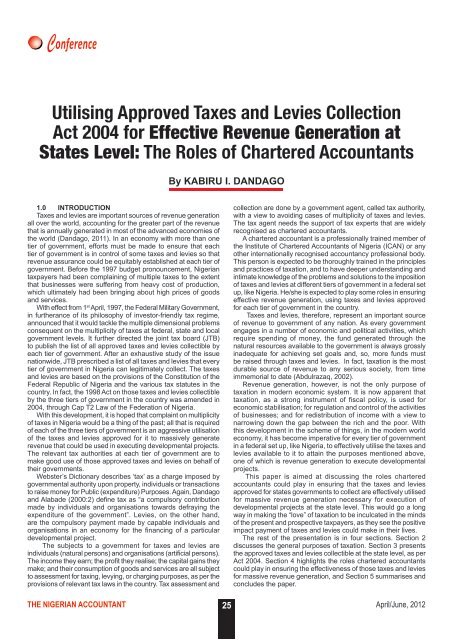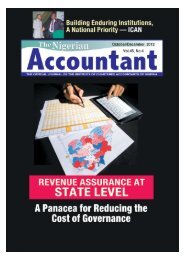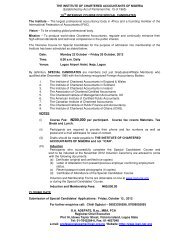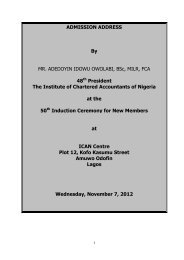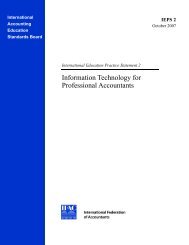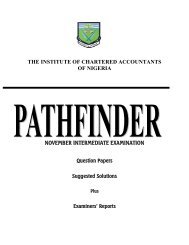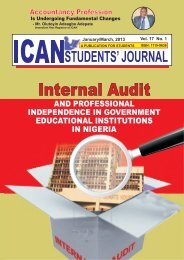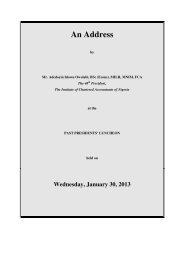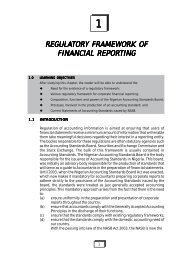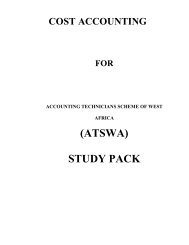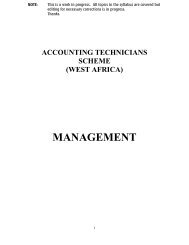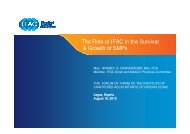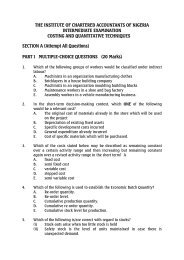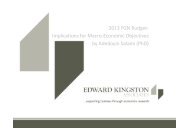The Nigerian Accountant 2012 - The Institute of Chartered ...
The Nigerian Accountant 2012 - The Institute of Chartered ...
The Nigerian Accountant 2012 - The Institute of Chartered ...
Create successful ePaper yourself
Turn your PDF publications into a flip-book with our unique Google optimized e-Paper software.
Conference<br />
Utilising Approved Taxes and Levies Collection<br />
Act 2004 for Effective Revenue Generation at<br />
States Level: <strong>The</strong> Roles <strong>of</strong> <strong>Chartered</strong> <strong>Accountant</strong>s<br />
By KABIRU I. DANDAGO<br />
1.0 INTRODUCTION<br />
Taxes and levies are important sources <strong>of</strong> revenue generation<br />
all over the world, accounting for the greater part <strong>of</strong> the revenue<br />
that is annually generated in most <strong>of</strong> the advanced economies <strong>of</strong><br />
the world (Dandago, 2011). In an economy with more than one<br />
tier <strong>of</strong> government, efforts must be made to ensure that each<br />
tier <strong>of</strong> government is in control <strong>of</strong> some taxes and levies so that<br />
revenue assurance could be equitably established at each tier <strong>of</strong><br />
government. Before the 1997 budget pronouncement, <strong>Nigerian</strong><br />
taxpayers had been complaining <strong>of</strong> multiple taxes to the extent<br />
that businesses were suffering from heavy cost <strong>of</strong> production,<br />
which ultimately had been bringing about high prices <strong>of</strong> goods<br />
and services.<br />
With effect from 1 st April, 1997, the Federal Military Government,<br />
in furtherance <strong>of</strong> its philosophy <strong>of</strong> investor-friendly tax regime,<br />
announced that it would tackle the multiple dimensional problems<br />
consequent on the multiplicity <strong>of</strong> taxes at federal, state and local<br />
government levels. It further directed the joint tax board (JTB)<br />
to publish the list <strong>of</strong> all approved taxes and levies collectible by<br />
each tier <strong>of</strong> government. After an exhaustive study <strong>of</strong> the issue<br />
nationwide, JTB prescribed a list <strong>of</strong> all taxes and levies that every<br />
tier <strong>of</strong> government in Nigeria can legitimately collect. <strong>The</strong> taxes<br />
and levies are based on the provisions <strong>of</strong> the Constitution <strong>of</strong> the<br />
Federal Republic <strong>of</strong> Nigeria and the various tax statutes in the<br />
country. In fact, the 1998 Act on those taxes and levies collectible<br />
by the three tiers <strong>of</strong> government in the country was amended in<br />
2004, through Cap T2 Law <strong>of</strong> the Federation <strong>of</strong> Nigeria.<br />
With this development, it is hoped that complaint on multiplicity<br />
<strong>of</strong> taxes in Nigeria would be a thing <strong>of</strong> the past; all that is required<br />
<strong>of</strong> each <strong>of</strong> the three tiers <strong>of</strong> government is an aggressive utilisation<br />
<strong>of</strong> the taxes and levies approved for it to massively generate<br />
revenue that could be used in executing developmental projects.<br />
<strong>The</strong> relevant tax authorities at each tier <strong>of</strong> government are to<br />
make good use <strong>of</strong> those approved taxes and levies on behalf <strong>of</strong><br />
their governments.<br />
Webster’s Dictionary describes ‘tax’ as a charge imposed by<br />
governmental authority upon property, individuals or transactions<br />
to raise money for Public (expenditure) Purposes. Again, Dandago<br />
and Alabade (2000:2) define tax as “a compulsory contribution<br />
made by individuals and organisations towards defraying the<br />
expenditure <strong>of</strong> the government”. Levies, on the other hand,<br />
are the compulsory payment made by capable individuals and<br />
organisations in an economy for the financing <strong>of</strong> a particular<br />
developmental project.<br />
<strong>The</strong> subjects to a government for taxes and levies are<br />
individuals (natural persons) and organisations (artificial persons).<br />
<strong>The</strong> income they earn; the pr<strong>of</strong>it they realise; the capital gains they<br />
make; and their consumption <strong>of</strong> goods and services are all subject<br />
to assessment for taxing, levying, or charging purposes, as per the<br />
provisions <strong>of</strong> relevant tax laws in the country. Tax assessment and<br />
collection are done by a government agent, called tax authority,<br />
with a view to avoiding cases <strong>of</strong> multiplicity <strong>of</strong> taxes and levies.<br />
<strong>The</strong> tax agent needs the support <strong>of</strong> tax experts that are widely<br />
recognised as chartered accountants.<br />
A chartered accountant is a pr<strong>of</strong>essionally trained member <strong>of</strong><br />
the <strong>Institute</strong> <strong>of</strong> <strong>Chartered</strong> <strong>Accountant</strong>s <strong>of</strong> Nigeria (ICAN) or any<br />
other internationally recognised accountancy pr<strong>of</strong>essional body.<br />
This person is expected to be thoroughly trained in the principles<br />
and practices <strong>of</strong> taxation, and to have deeper understanding and<br />
intimate knowledge <strong>of</strong> the problems and solutions to the imposition<br />
<strong>of</strong> taxes and levies at different tiers <strong>of</strong> government in a federal set<br />
up, like Nigeria. He/she is expected to play some roles in ensuring<br />
effective revenue generation, using taxes and levies approved<br />
for each tier <strong>of</strong> government in the country.<br />
Taxes and levies, therefore, represent an important source<br />
<strong>of</strong> revenue to government <strong>of</strong> any nation. As every government<br />
engages in a number <strong>of</strong> economic and political activities, which<br />
require spending <strong>of</strong> money, the fund generated through the<br />
natural resources available to the government is always grossly<br />
inadequate for achieving set goals and, so, more funds must<br />
be raised through taxes and levies. In fact, taxation is the most<br />
durable source <strong>of</strong> revenue to any serious society, from time<br />
immemorial to date (Abdulrazaq, 2002).<br />
Revenue generation, however, is not the only purpose <strong>of</strong><br />
taxation in modern economic system. It is now apparent that<br />
taxation, as a strong instrument <strong>of</strong> fiscal policy, is used for<br />
economic stabilisation; for regulation and control <strong>of</strong> the activities<br />
<strong>of</strong> businesses; and for redistribution <strong>of</strong> income with a view to<br />
narrowing down the gap between the rich and the poor. With<br />
this development in the scheme <strong>of</strong> things, in the modern world<br />
economy, it has become imperative for every tier <strong>of</strong> government<br />
in a federal set up, like Nigeria, to effectively utilise the taxes and<br />
levies available to it to attain the purposes mentioned above,<br />
one <strong>of</strong> which is revenue generation to execute developmental<br />
projects.<br />
This paper is aimed at discussing the roles chartered<br />
accountants could play in ensuring that the taxes and levies<br />
approved for states governments to collect are effectively utilised<br />
for massive revenue generation necessary for execution <strong>of</strong><br />
developmental projects at the state level. This would go a long<br />
way in making the “love” <strong>of</strong> taxation to be inculcated in the minds<br />
<strong>of</strong> the present and prospective taxpayers, as they see the positive<br />
impact payment <strong>of</strong> taxes and levies could make in their lives.<br />
<strong>The</strong> rest <strong>of</strong> the presentation is in four sections. Section 2<br />
discusses the general purposes <strong>of</strong> taxation. Section 3 presents<br />
the approved taxes and levies collectible at the state level, as per<br />
Act 2004. Section 4 highlights the roles chartered accountants<br />
could play in ensuring the effectiveness <strong>of</strong> those taxes and levies<br />
for massive revenue generation, and Section 5 summarises and<br />
concludes the paper.<br />
THE NIGERIAN ACCOUNTANT 25<br />
April/June, <strong>2012</strong>


